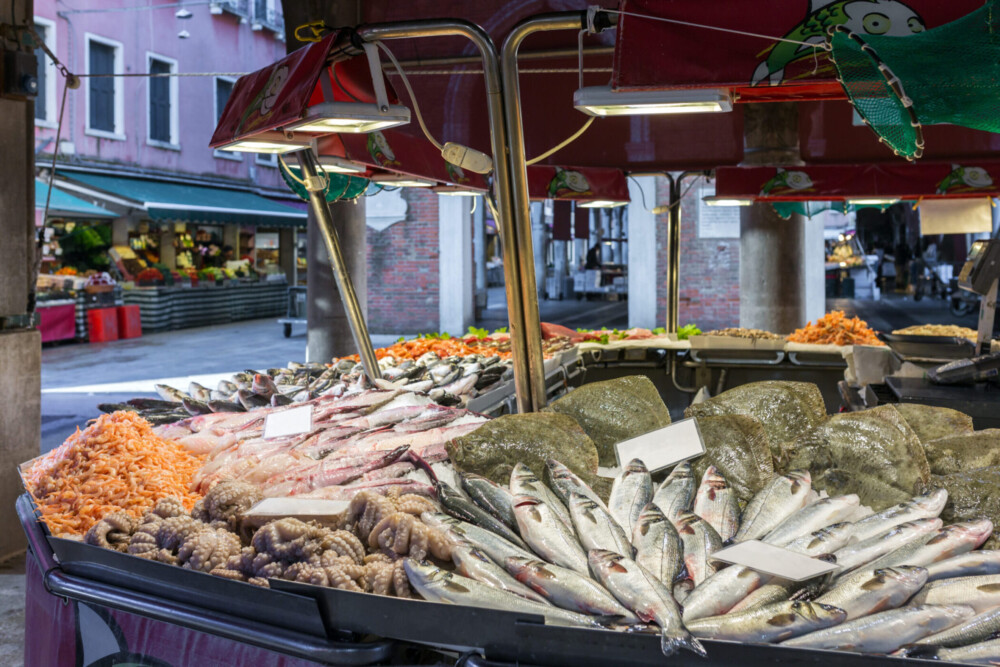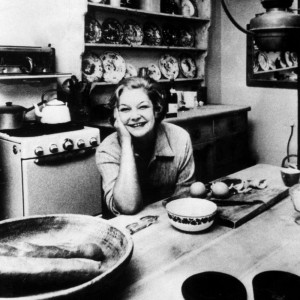
Elizabeth David – The Writer
Posted on Fri 10th January, 2025 by Elizabeth David Matters – editorial team
Mention the name ‘Elizabeth David’ and many people, of a certain generation, will immediately think of a woman who was an inspirational cook during the second half of the twentieth century; they may well recall some of her recipes and indeed find copies of her books on their shelves. There is no doubt that Elizabeth David changed the landscape of post-war cooking in Britain and was an authoritative figure for generations of chefs, food writers and the public at large. It is not too fanciful to suggest that the landscape of British cuisine from the 1950s through to the 1990s was redefined by Elizabeth David.
However innovative Elizabeth David was in her use of fresh produce, seasonal produce and recipes collected from Europe and the Levant, it was her very able and concise style as a writer that made her, it could be argued, one of Britain’s most widely read cooks and food connoisseurs. Elizabeth David was a creator of visual images, of places, ingredients and meals that made its mark with fellow food writers, journalists, chefs, restauranteurs and the well-informed public who valued good food. Elizabeth David wrote in a way that was immediately accessible, concise, inviting and without unnecessary complications. Her writing opened up a world of delicious foods and flavours to the reader in a way which made the humblest cook feel that they could achieve at least something of the enticing culinary world that Elizabeth David painted with words in her many books and articles.
‘The essence of good cooking lies in simplicity and quality ingredients’
Elizabeth David
In total, Elizabeth David wrote sixteen books on cooking. Her first book, published by John Lehmann in 1950, was ‘A Book of Mediterranean Food’ and her last book, published by Robert Hale in 1984, was ‘An Omelette and a Glass of Wine’. After her death, her friend and literary executor, Jill Norman, collected Elizabeth David’s notes for a new book that Elizabeth David was planning to write on the history of ice and ices. In 1994, Michael Joseph published ‘Harvest of the Cold Months: the Social History of Ice and Ices’.
Subsequently several books containing collections of Elizabeth David’s recipes and articles have been published, the latest being a collection of four small volumes written by Elizabeth David for her shop and unpublished for nearly fifty years. This original collection was published in 2023 by Grub Street. The collection includes Elizabeth David’s work on traditional British foods which, at the time of her death, Elizabeth David was rediscovering and researching. One can only speculate that had Elizabeth David lived longer, we may well have benefitted from her revisited and revitalised ideas on British food throughout the ages. The four volumes published as ‘The Elizabeth David Collection’ include the following works: ‘Syllabubs and Fruit Fools’, ‘Dried Herbs, Aromatics and Condiments’, ‘English Potted Meats and Fish Pastes’ and ‘The Baking of an English Loaf’.
‘It isn’t only fictional heroes to whom toast means home and comfort. It is related of the Duke of Wellington – I believe by Lord Ellesmere – that when he landed at Dover in 1814, after six years absence from England, the first order he gave at The Ship Inn was for an unlimited supply of buttered toast’
Elizabeth David
It is arguable that Elizabeth David’s books alone would not have given her the publicity that she gained, and indeed needed, to become the leading authority on food, cooking and ingredients in Britain during her life and long after her death. Elizabeth David had an extremely attractive writing style and wrote concisely, engagingly and in a way that was immediate and easy to understand. She wrote for many leading newspapers and magazines. The first national newspaper to offer her work was ‘The Sunday Times’ which published an article by her in its ‘Go’ travel magazine which was a joint venture with The Wine and Food Society. Elizabeth David secured a regular column in ‘Harper’s Magazine’ and she also began writing in the sister magazine of ‘Vogue’, ‘House & Garden’. The editor of ‘Vogue’, Audrey Withers, paid Elizabeth David £100 for a research trip to France, together with £20 per month. This trip together with subsequent trips to France led to the publication of ‘French Provincial Cooking’.
By 1960 Elizabeth David no longer had to accept editorial interference with the copy for her articles and she stopped writing for ‘The Sunday Times’ and for ‘Vogue’. Thereafter Elizabeth David was contracted to write weekly articles for ‘The Spectator’, ‘Sunday Despatch’ and ‘The Sunday Telegraph’. This weekly output in the mainstream media established her place as the premier cook and food writer in Britain and ensured that her books became bestsellers into the mass market.
‘The grotesque prudishness and archness with which garlic is treated in (England) has led to the superstition that rubbing the bowl with it before putting the salad in gives sufficient flavour. It rather depends whether you are going to eat the bowl or the salad’
Elizabeth David
Elizabeth continued to be a prolific writer well after she had achieved fame and success, but her energies began to dissipate once the shop was open and she had to deal with the commercial reality of working with business partners in an environment she found stressful and was not totally in control of. Research that Elizabeth David had started on remained unfinished, as did publications that she had started to work on. After her stroke, and despite withdrawing from the business of the shop, the dynamism of Elizabeth David’s earlier years slowed and work which she hoped to complete remained unfinished. Once Elizabeth accepted Jill Norman’s help, the situation improved but sadly Elizabeth David was involved in a serious road accident and this, together with her continuing ill health, brought much of her work to a halt.
Fortuitously Elizabeth David’s notes, together with the books she had collected and the recipes she had formulated, often from ancient manuscripts, meant that Jill Norman was able to continue with many of the projects that Elizabeth David had started and bring them to fruition by way of posthumous publication.
In conclusion it is important for us to understand that, in addition to a vast library that Elizabeth David collected and the immense volume of notes Elizabeth David stored, much of her knowledge and expertise came directly from her travels where she witnessed the preparation of dishes she was later to write about and create appropriate recipes for. Elizabeth David visited farms, vineyards and markets throughout Europe: all of her knowledge of authentic produce was acquired first-hand.
‘The eggs were so good that I am ashamed to say how many of them I consumed, and as for the butter, nous sommes en Bresse et le beurre n’ est pas mauvais, the landlady said as she placed the article before me. It was the poetry of butter and I ate a pound or two of it’
‘A Little Tour in France’, 1900, Henry James
At the top of this article can be found a picture of the Rialto Fish Market in Venice which was much loved by Elizabeth David. She relates how, dining in a restaurant on the island of Murano, she came across a dish of fresh, local asparagus, a variety of which she had not seen before, and which was only available for a few days in the early spring. Elizabeth David travelled to the Rialto Fish Market, where fresh fruit and vegetables were also sold, at six a.m. the following morning in order to secure this delicacy and to enjoy it in a meal. Such was Elizabeth David’s dedication to the exploration of new and delicious foods be they popular or, as in this case, extremely rare.



